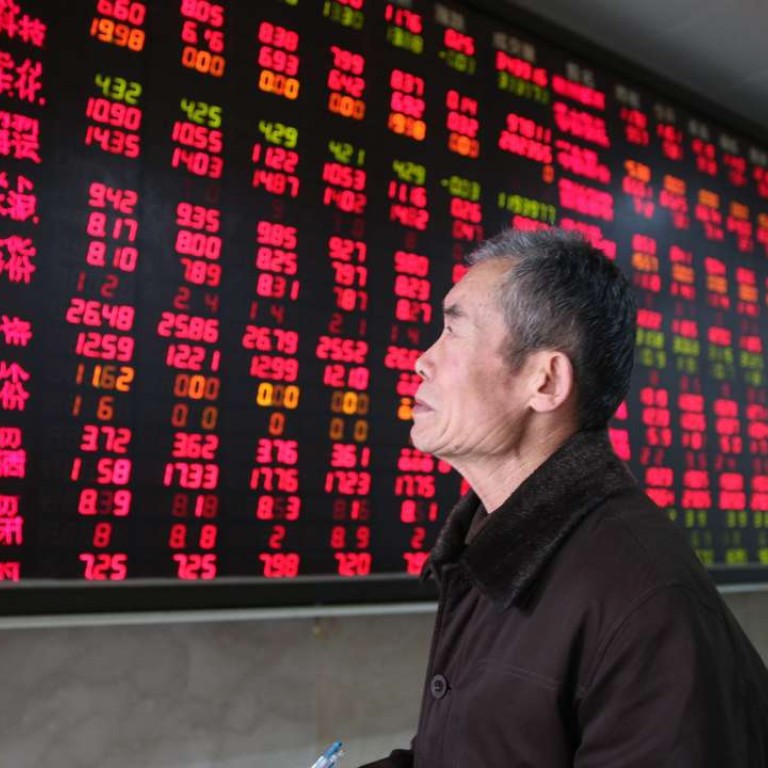
Hong Kong stocks edge up while mainland China shares end flat amid low turnover
Investors cautious as they factor in a potential US interest rate increase while short sellers continued to close their positions
Hong Kong stocks posted small gains on Monday as investors factored in a potential US interest rate increase and short sellers continued to close their positions, while mainland Chinese stocks ended flat.
Turnover for Hong Kong and mainland China market shares remained low, with analysts saying the trend will likely persist for a while.
The Hang Seng Index held its ground to close the day up 0.26 per cent, or 52.62 points, at 20,629.39. The Hang Seng China Enterprises index edged up 0.34 per cent, or 29.48 points, to 8,624.76.
Turnover in Hong Kong remained relatively low, reaching HK$58.5 billion, compared to an average of HK$65 billion over the past two months, according to analysts.
The Shanghai Composite Index reversed its morning losses to end at 0.05 per cent, or 1.4 points higher, at 2,822.45, while the CSI 300 tracking large companies listed in Shanghai and Shenzhen inched up 0.14 per cent, or 4.21 points, to 3,066.71.
The Shenzhen Composite Index slid 0.46 per cent, or 8.27 points, to 1,798.77. The Nasdaq-style ChiNext slipped 0.55 per cent, or 11.37 points, to 2,058.52.
Total turnover in Shanghai and Shenzhen continued to be muted, at 333.5 billion yuan (HK$394.4 billion).
Among stocks with the largest turnover in Hong Kong, banks and insurers notched up slight gains in the market.
Shares of China Construction Bank and Bank of China Hong Kong rose 0.61 per cent and 1.94 per cent, respectively.
Ping An Insurance (Group) Company’s shares jumped 0.74 per cent to close tradingat HK$33.90.
“We continue to see some traders closing their short positions. Meanwhile, the market seems to have factored in the chances of a US rate hike in recent days,” said Ben Kwong Man-bun, executive director and head of research at KGI Asia.
Tencent is showing some signs of fatigue now. We may lose one of the biggest engines, but we won’t see a sell-off just yet
Short selling is motivated by the belief that a security’s price will decline, enabling it to be bought back at a lower price to make a profit.
The US Federal Reserve could raise interest rates “in the coming months” if the economy picks up as expected and jobs continue to be generated, US central bank chief Janet Yellen said on Friday, bolstering the case for a rate increase in June or July.
She said in a speech at Harvard University that an interest rate increase in coming months would “probably” be “appropriate.” The US dollar rallied on her comments.
Alex Wong Kwok-ying, asset management director at Ample Capital, said Hong Kong stocks had a good run last week, propped up by the banking sector and Chinese technology giant Tencent.
“Tencent is showing some signs of fatigue now. We may lose one of the biggest engines, but we won’t see a sell-off just yet,” said Wong. “We may be stuck for a while.”
In China, the technology and banking sector led the gains in the stock market, increasing 1.34 per cent and 0.52 per cent, respectively.
Wong explained that investors are not willing to buy or sell in the mainland markets because prices are still expensive compared to other markets, as it is believed a lot of stocks are still being held by government-backed parties since the intervention last August during China’s stock market rout.
“The A-share market is basically dead. Turnover remains extremely thin,” said Wong. “The market is like what we see in the Hong Kong property market, a low turnover, but price remains a little bit [too] high [for buyers].”


